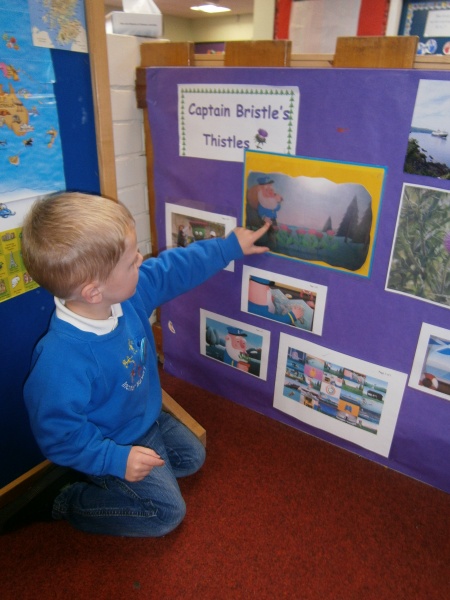 Yvonne McBlain from Falkirk Education Services Curriculum Support team has been finding out about some active and engaging interdisciplinary learning happening at Inchlair Nursery School. The pre and ante-pre school children have become immersed in preparations for the Commonwealth Games following their reading of the story “Captain Bristle’s Thistles”. This story (click to see the story video) really captured the imaginations of the children and has led very naturally into development of their knowledge within various disciplines. Isobel Edmond, head teacher at the nursery, has worked with staff colleagues to involve parents in extending and deepening pupil understanding of this international event. Click here to see one of the documents used to keep parents informed of developments with this interdisciplinary work. Click here to see how one of the children continued to develop his learning at home with his mum. Staff are responding to the children’s interest in the progress of the Queen’s Baton Relay by using a map display within the nursery. The children are developing this display by noting and bringing in photos or other items which show their links to the relay route on the map. Click on the photograph at the start of this post to watch Inchlair pupils sharing their learning.
Yvonne McBlain from Falkirk Education Services Curriculum Support team has been finding out about some active and engaging interdisciplinary learning happening at Inchlair Nursery School. The pre and ante-pre school children have become immersed in preparations for the Commonwealth Games following their reading of the story “Captain Bristle’s Thistles”. This story (click to see the story video) really captured the imaginations of the children and has led very naturally into development of their knowledge within various disciplines. Isobel Edmond, head teacher at the nursery, has worked with staff colleagues to involve parents in extending and deepening pupil understanding of this international event. Click here to see one of the documents used to keep parents informed of developments with this interdisciplinary work. Click here to see how one of the children continued to develop his learning at home with his mum. Staff are responding to the children’s interest in the progress of the Queen’s Baton Relay by using a map display within the nursery. The children are developing this display by noting and bringing in photos or other items which show their links to the relay route on the map. Click on the photograph at the start of this post to watch Inchlair pupils sharing their learning.
Category: Social Studies
Larbert Cluster Interdisciplinary Planning
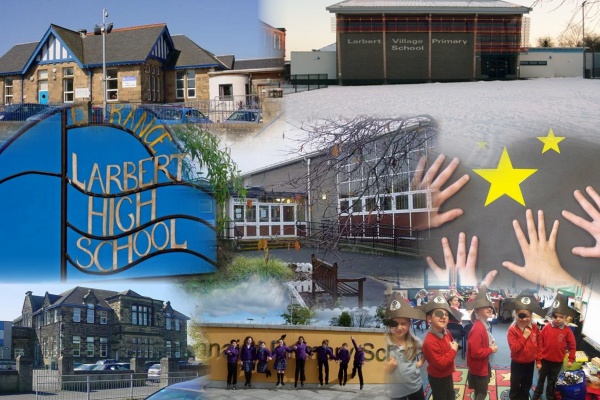 Yvonne McBlain of Falkirk Curriculum Support Team was thrilled to attend the first of a series of cross-sector cluster interdisciplinary planning sessions on Tuesday 17th September 2013. As chair of the Commonwealth Games Interdisciplinary Project sub-group, Linda-Anne Reid worked with colleagues to co-ordinate this collegiate planning. Early year’s practitioners and primary 1 teachers met in Stenhousemuir PS, first level teachers met in Carron PS, and second and third in Kinnaird PS. All staff were given relevant planning materials and information in advance, including the cluster plan, NAR planning flow chart, NAR planning flow chart instructions and Falkirk Community Trust/Active Schools Going for Glasgow Accreditation paper. Isobel Edmond provided early level practitioners with a very clear introductory overview of the potential benefits of this interdisciplinary learning context. Morag Carson then explained that each of the 3 hour-long planning sessions would involve same stage groups planning within 3 bundles of E & Os. This means that the Larbert cluster will generate at least 3 interdisciplinary plans per level which meet experiences and outcomes from: Social subjects & Expressive Arts, Social subjects & Technology, & Social subjects and Science. They are more than happy for these plans to be made available across the authority when complete. Once these groups were established, their first task was to identify the small bundle of E & Os they felt could be progressed by this context, for their learners. Yvonne and Linda-Anne enjoyed a whistle-stop tour of the nursery and primary 1 groups, and then nipped up to Kinnaird PS to pop into the second and third level groups. The staff involved had already made choices about their E & Os , and begun to consider learning intentions, and the best activities to develop knowledge, understanding and skills within the Commonwealth Games context. There will be 2 further planning sessions on 30th October and 21st November, but some groups have opted to do one double session instead. Although clearly linking into national events taking place in 2014, this way of working across-cluster offers potential benefits on many levels: the planning of robust interdisciplinary learning, development of understanding of skills progression, and the sharing of practice generally. All in all, a really active, purposeful form of collegiate professional learning!
Yvonne McBlain of Falkirk Curriculum Support Team was thrilled to attend the first of a series of cross-sector cluster interdisciplinary planning sessions on Tuesday 17th September 2013. As chair of the Commonwealth Games Interdisciplinary Project sub-group, Linda-Anne Reid worked with colleagues to co-ordinate this collegiate planning. Early year’s practitioners and primary 1 teachers met in Stenhousemuir PS, first level teachers met in Carron PS, and second and third in Kinnaird PS. All staff were given relevant planning materials and information in advance, including the cluster plan, NAR planning flow chart, NAR planning flow chart instructions and Falkirk Community Trust/Active Schools Going for Glasgow Accreditation paper. Isobel Edmond provided early level practitioners with a very clear introductory overview of the potential benefits of this interdisciplinary learning context. Morag Carson then explained that each of the 3 hour-long planning sessions would involve same stage groups planning within 3 bundles of E & Os. This means that the Larbert cluster will generate at least 3 interdisciplinary plans per level which meet experiences and outcomes from: Social subjects & Expressive Arts, Social subjects & Technology, & Social subjects and Science. They are more than happy for these plans to be made available across the authority when complete. Once these groups were established, their first task was to identify the small bundle of E & Os they felt could be progressed by this context, for their learners. Yvonne and Linda-Anne enjoyed a whistle-stop tour of the nursery and primary 1 groups, and then nipped up to Kinnaird PS to pop into the second and third level groups. The staff involved had already made choices about their E & Os , and begun to consider learning intentions, and the best activities to develop knowledge, understanding and skills within the Commonwealth Games context. There will be 2 further planning sessions on 30th October and 21st November, but some groups have opted to do one double session instead. Although clearly linking into national events taking place in 2014, this way of working across-cluster offers potential benefits on many levels: the planning of robust interdisciplinary learning, development of understanding of skills progression, and the sharing of practice generally. All in all, a really active, purposeful form of collegiate professional learning!
Powtoon, School YouTube Channel, Twitter for Schools, Maths Interactives and History On This Day – a support session for ICT Co-ordinators in Falkirk Primary Schools
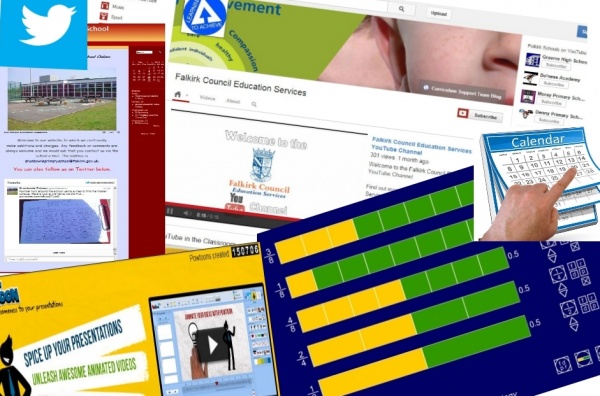 Powtoon, School YouTube Channel, Twitter for Schools, Maths Interactives & History On This Day – some of the tools presented by Malcolm Wilson (ICT Curriculum Development Office in the Curriculum Support Team of Falkirk Council Education Services) at the support sessions for ICT Co-ordinators in Falkirk Primary Schools (and to which secondary ICT Co-ordinators are also invited) – an opportunity to be guided through a hands-on exploration and use of a variety of online tools to support learning and teaching in Falkirk primary schools.
Powtoon, School YouTube Channel, Twitter for Schools, Maths Interactives & History On This Day – some of the tools presented by Malcolm Wilson (ICT Curriculum Development Office in the Curriculum Support Team of Falkirk Council Education Services) at the support sessions for ICT Co-ordinators in Falkirk Primary Schools (and to which secondary ICT Co-ordinators are also invited) – an opportunity to be guided through a hands-on exploration and use of a variety of online tools to support learning and teaching in Falkirk primary schools.
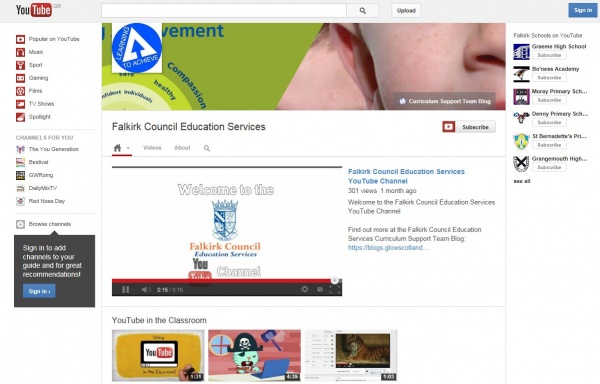 * The YouTube Channels for Falkirk Council Education Services and schools provides a resource to share videos created for Education Services in Falkirk Council as well as a link to each of the YouTube channels of Falkirk Council educational establishments. Having a school YouTube Channel provides a means to upload school-created videos and more easily share or embed elsewhere such as class blogs or school websites. Playlists in a YouTube Channel also let you bring together videos, of relevance to your own school, created by others from elsewhere on YouTube in topic/curricular headings. Falkirk school YouTube channels are created centrally for each school on request so that the technical setup of settings, etc, is not a burden on schools, yet the control for the each school channel is with the school.
* The YouTube Channels for Falkirk Council Education Services and schools provides a resource to share videos created for Education Services in Falkirk Council as well as a link to each of the YouTube channels of Falkirk Council educational establishments. Having a school YouTube Channel provides a means to upload school-created videos and more easily share or embed elsewhere such as class blogs or school websites. Playlists in a YouTube Channel also let you bring together videos, of relevance to your own school, created by others from elsewhere on YouTube in topic/curricular headings. Falkirk school YouTube channels are created centrally for each school on request so that the technical setup of settings, etc, is not a burden on schools, yet the control for the each school channel is with the school.
 * Powtoon provides a free online tool to create short animated promotional videos for schools or event in schools. These can be embedded on school websites and blogs. These animated videos can be used to promote a school event, activity or explain a topic. A description and examples can be found here: http://glo.li/WY4Ek2.
* Powtoon provides a free online tool to create short animated promotional videos for schools or event in schools. These can be embedded on school websites and blogs. These animated videos can be used to promote a school event, activity or explain a topic. A description and examples can be found here: http://glo.li/WY4Ek2.
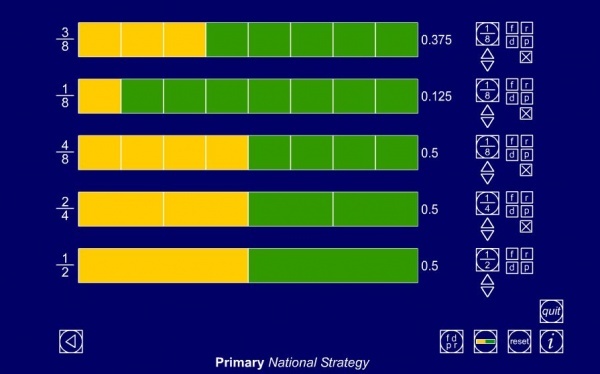 * Interactive Teaching Programs for Numeracy and Mathematics are free online resources designed for whole-class teaching via interactive whiteboard. Each tool is versatile in letting teachers use it in any way to best suit the needs of their learners. For each tool there is an extensive helpguide available as a pdf for viewing either on-screen or printing out. These tools are designed to support the teaching and learning process with a teacher guiding a pupil, group or class of pupils, through their learning, and a pace appropriate to them. They are flexible tools so can be used at many stages in primary school. There is a host of tools included covering: Area, Calculating angles, Coordinates, Counting on and back, Data handling, Decimal number line, Difference, Division Grid, Fixing points, Fractions, Grouping, Isometric grid, Line graph, Measuring cylinder, Measuring scales, Moving digits, Multiplication facts, Multiplication grid, Number dials, Number facts, Number facts, Number grid, Number line, Number spinners, Ordering numbers, Place value, Polygon, Remainders after division, Ruler, Symmetry, Tell the time, Thermometer, and Twenty cards. They are available online here: http://glo.li/UR9HOS
* Interactive Teaching Programs for Numeracy and Mathematics are free online resources designed for whole-class teaching via interactive whiteboard. Each tool is versatile in letting teachers use it in any way to best suit the needs of their learners. For each tool there is an extensive helpguide available as a pdf for viewing either on-screen or printing out. These tools are designed to support the teaching and learning process with a teacher guiding a pupil, group or class of pupils, through their learning, and a pace appropriate to them. They are flexible tools so can be used at many stages in primary school. There is a host of tools included covering: Area, Calculating angles, Coordinates, Counting on and back, Data handling, Decimal number line, Difference, Division Grid, Fixing points, Fractions, Grouping, Isometric grid, Line graph, Measuring cylinder, Measuring scales, Moving digits, Multiplication facts, Multiplication grid, Number dials, Number facts, Number facts, Number grid, Number line, Number spinners, Ordering numbers, Place value, Polygon, Remainders after division, Ruler, Symmetry, Tell the time, Thermometer, and Twenty cards. They are available online here: http://glo.li/UR9HOS
 * #OnThisDay in History – resources for connecting historical events, related to specific anniversary dates, to pupils today, can provide a means to connect events of past with work in class on specific days across curriculum – helps make connections with the past whether for a curricular area, a historical topic era, or lesson starter on any specific day. These free online tools provide short descriptions of events which happened on each day in the calendar (for any year). They can be searched on specific days, and any year. So if studying a historical period such as World War 2, the Romans, etc then events in sequnce day by day in any particular year can be shown. If teachers like to help pupils relate to historical events sometimes the starting link can be to look at events which happened on the day (in any any year) of their birth, or the year of their birth. If looking for links to music events, or studying art techniques through artists in history, then there are specific sites here which group these related anniversaries of events (including first performances, display, births and deaths). The information which suits the occasion for the teacher and learners on any specific occasion can be used on a class blog or school website as a “hook” to connect events yesterday and today http://glo.li/Whu37F
* #OnThisDay in History – resources for connecting historical events, related to specific anniversary dates, to pupils today, can provide a means to connect events of past with work in class on specific days across curriculum – helps make connections with the past whether for a curricular area, a historical topic era, or lesson starter on any specific day. These free online tools provide short descriptions of events which happened on each day in the calendar (for any year). They can be searched on specific days, and any year. So if studying a historical period such as World War 2, the Romans, etc then events in sequnce day by day in any particular year can be shown. If teachers like to help pupils relate to historical events sometimes the starting link can be to look at events which happened on the day (in any any year) of their birth, or the year of their birth. If looking for links to music events, or studying art techniques through artists in history, then there are specific sites here which group these related anniversaries of events (including first performances, display, births and deaths). The information which suits the occasion for the teacher and learners on any specific occasion can be used on a class blog or school website as a “hook” to connect events yesterday and today http://glo.li/Whu37F
 * Twitter for schools – most Falkirk schools have school Twitter accounts to help share activities going on in the school and increase engagement by the wider community. A list of these Falkirk educational establishments with links to their Twitter feeds (as well as resources supporting the use of Twitter by schools) can be found here: http://glo.li/12iKXTz. Once the Twitter feed of posts is embedded on school websites, posting information via Twitter on a mobile device makes it quicker to add news items onto the website as the information being shared by the school is instantly shared on the website without the need to log into the editing panel of the school website. Using Twitter also means that parents and others in the school community can choose to follow the latest information from the school, and share this with others to help more widely spread the good work of the school. Support can be provided to schools looking at setting up and using a school Twitter account or getting it added to a school website.
* Twitter for schools – most Falkirk schools have school Twitter accounts to help share activities going on in the school and increase engagement by the wider community. A list of these Falkirk educational establishments with links to their Twitter feeds (as well as resources supporting the use of Twitter by schools) can be found here: http://glo.li/12iKXTz. Once the Twitter feed of posts is embedded on school websites, posting information via Twitter on a mobile device makes it quicker to add news items onto the website as the information being shared by the school is instantly shared on the website without the need to log into the editing panel of the school website. Using Twitter also means that parents and others in the school community can choose to follow the latest information from the school, and share this with others to help more widely spread the good work of the school. Support can be provided to schools looking at setting up and using a school Twitter account or getting it added to a school website.
Feedback from participants at the support sessions included:
“Great, practical ideas as ever!” JC – St Bernadette’s Primary School
“Lots of useful resources.” AW – Head of Muir Primary School
“Lots of great ideas today – very worthwhile.” GM – St Joseph’s Primary School
“Now a convert to Twitter!” CM – Bo’ness Academy
“Yet another very useful session – many thanks.” LB – Moray Primary School
“Helpful and informative insight into ICT developments.” SD – Grangemouth High School
“Lots of great ideas.” FB – Kinnaird Primary School
“Great information – thanks!” FK – Bantaskin Primary School
“Thank you – very informative as always!” CH – Comely Park Primary School
“Very practical and helpful as ever.” RO – Easter Carmuirs Primary School
Global Storylines Roadshow in Falkirk
Yvonne McBlain and Anne Hutchison from Falkirk Curriculum Support team have worked with Diana Ellis and Marie-Jeanne McNaughton to organise a Global Storylines Roadshow event in Camelon Education Centre between 3.30pm and 5.15pm on 30th May 2013. This event is for primary and nursery practitioners who may be interested in joining a potential Falkirk cohort of teachers accessing this high quality professional learning next session. Diana and Marie-Jeanne will share the content and format of this valuable global citizenship training, as well as the impact it has had on teachers and pupils. A number of teachers in our schools have already expressed a firm interest in being part of this Falkirk cohort. This event is designed to ensure that everyone has a chance to find out more about what is involved. Click here to read the descriptor for this course – applications should be made through your CPD co-ordinator in the usual way. You may also want to visit the Global Storylines website . Here are the thoughts of a teacher and a pupil who have taken part in tha Global Storyline project:
“My confidence in teaching these current issues has really increased and I can now use what I’ve learned to develop Global Citizenship right across different curriculuar areas and incorporate the drama techniques in all the different activities we use.” Principal Teacher
“It makes you think about it, because unless you look at something, it’s quite hard to imagine how people feel in real life, you can’t just step out of drama and go back into real life. When they’re in that position iit puts things into perspective.” 11-year-old pupil.
These testimonials express some of the benefits of applying storyline teaching strategies to progress pupil knowledge and understanding of global citizenship issues.
ICT Resources to Support Social Subjects in the Primary School
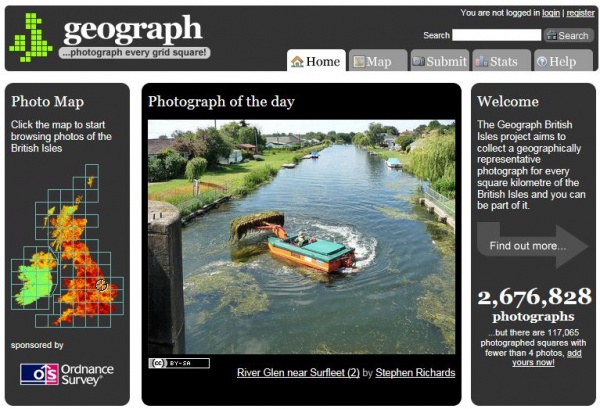 Malcolm Wilson, ICT Curriculum Development Officer in the Curriculum Support Team of Falkirk Council Education Services, presented a session with primary class teachers on a variety of ICT resources to support teaching Social Subjects in the Primary School.
Malcolm Wilson, ICT Curriculum Development Officer in the Curriculum Support Team of Falkirk Council Education Services, presented a session with primary class teachers on a variety of ICT resources to support teaching Social Subjects in the Primary School.
Resources
Here are links to some of the resources shared:
What was there, then and now – Tools to compare photographs of same views then and now http://glo.li/pzwVdT
Class character exchange – engaging with another class in another part of the world by exchanging a soft-toy character or other figure. Provides a route into pupils having a better understanding of people in place. http://glo.li/NUzqij
On This Day in History Link topic to events by particular days http://glo.li/Whu37F
Timeline Tools – Marking Milestones in History Timeline Tools including Fakebook – Facebook-like timeline, Twister – Twitter-like events as they happen http://glo.li/IYu6fU
Geograph the British Isles – combining mapping, photography and gaming http://glo.li/HbTeQZ
Our Governments – Scottish, UK and EU parliaments http://glo.li/mSDggW
World Disasters and Emergencies – Learn about natural disasters around the world. Resources to support dealing with emergencies http://glo.li/JxNmxr
Use digital video cameras for pupils to engage with social studies topics and demonstrate their understanding of the information. Create stop-motion animation to illustrate features, concepts or event sequence. Resources here for video cameras: http://glo.li/gTmdzS. Resources for editing video: https://blogs.glowscotland.org.uk/fa/ICTFalkirkPrimaries/2010/09/16/video-editing-with-windows-live-movie-maker/Resources here for making videos from still image photographs: https://blogs.glowscotland.org.uk/fa/ICTFalkirkPrimaries/2011/03/09/photostory-3/
Outdoor Learning – the outdoor clasroom http://glo.li/rycd4U
 SCRAN – Cultural Resources Archive – Images & videos with full descriptions and automatic credits for use in class projects. Free access through Glow http://glo.li/mTo4Ui
SCRAN – Cultural Resources Archive – Images & videos with full descriptions and automatic credits for use in class projects. Free access through Glow http://glo.li/mTo4Ui
Google Earth – Explore anywhere in the world http://glo.li/v4NDkU
Quiz-creation tools – create self-correcting quizzes, provide feedback on what has been learned by pupils, pupils creating quizzes motivates & helps embed learning http://glo.li/g73CnR
Further Online Links
Teaching Ideas – a series of crowd-sourced ideas shared by teachers http://www.teachingideas.co.uk/history/contents.htm
http://www.teachingideas.co.uk/geography/contents.htm
Cybrary Man links to resources by category http://cybraryman.com/socialstudieslinks.html
Beangeese Blog for Slamannan Primary School
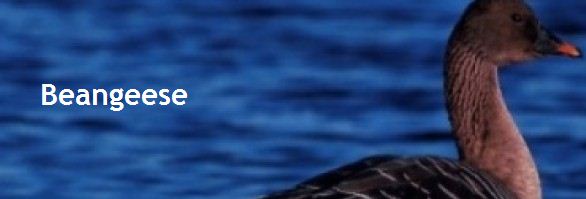 Malcolm Wilson, ICT Curriculum Development Officer of the Curriculum Support Team of Falkirk Council Education Services, supported staff at Slamannan Primary School in setting up a blog to share the learning journey of pupils in relation to their activities around a natural phenomenon which takes place every year not far from the school.
Malcolm Wilson, ICT Curriculum Development Officer of the Curriculum Support Team of Falkirk Council Education Services, supported staff at Slamannan Primary School in setting up a blog to share the learning journey of pupils in relation to their activities around a natural phenomenon which takes place every year not far from the school.
In October every year, Beangeese fly over from Scandinavia to Slamannan’s plateau to graze for the winter. In February they fly off again to sunnier climes. Slamannan is one of the very few places in the whole of the British Isles where this happens.
This blog was set up to be able to provide a means to share with the wider community. In addition to sharing about what has been happening, with photographs and descriptions, pupils have been adding their comments on the blog, clearly demonstrating their engagement and enjoyment of their activity.
Well done to staff and pupils of Slamannan Primary School for making great use of a blog to share your learning journey.
Click here to visit the Beangeese blog at Slamannan Primary School.

